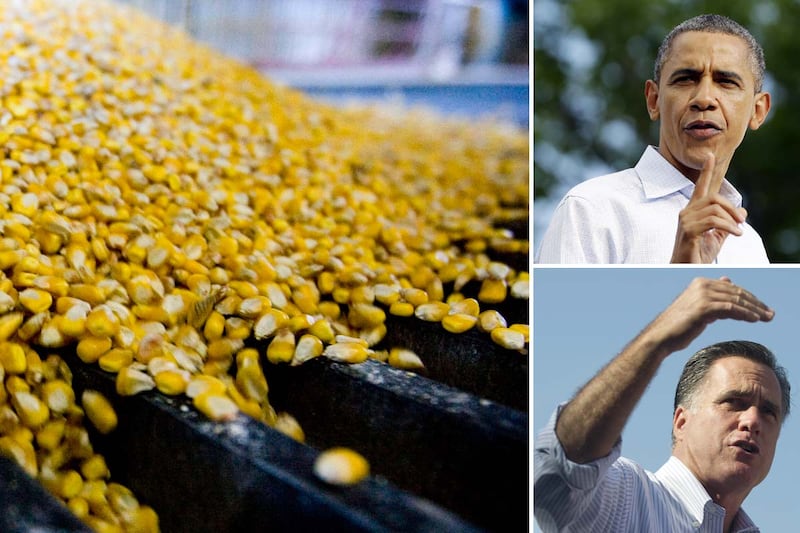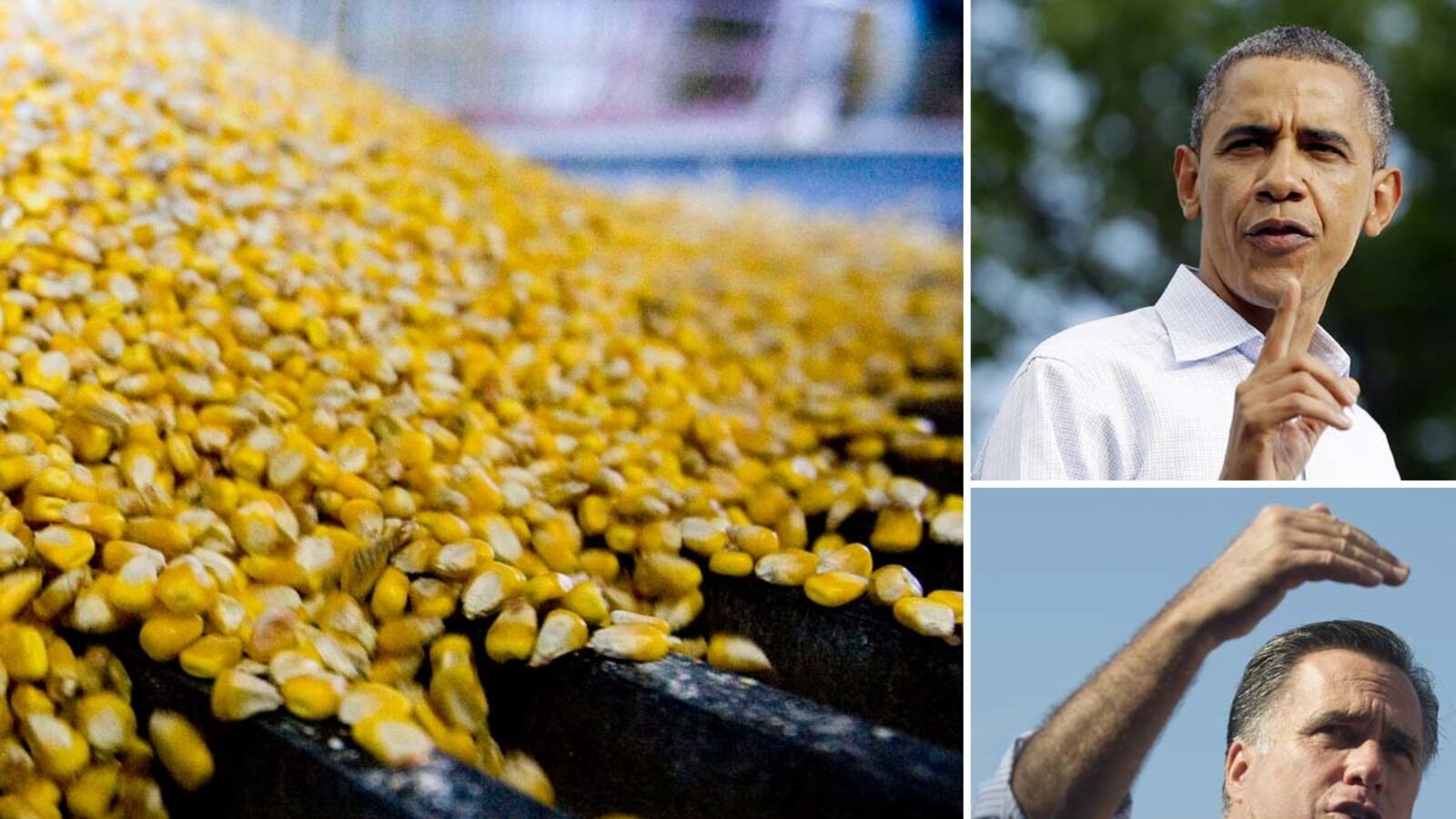Corn ethanol is the Franken fuel of American politics. Neither party, neither candidate dares question the program that requires motorists to buy a corrosive, low-heat-content, hydrophilic fuel adulterant—even though that program is now consuming 37 percent of all American corn production and driving up food prices.
The corn-ethanol boondoggle got a free pass in Tampa. The Republicans didn’t talk about biofuels during their hurricane-shortened convention; the GOP’s 2012 platform doesn’t even mention ethanol. And this long-running robbery of taxpayers will get another free pass from the Democrats during their wingding in Charlotte, N.C.
The two presidential candidates dare not call attention to the corn-ethanol scam despite the drought that is ravaging the Corn Belt and sending corn, and other grain prices, to record highs. Mitt Romney and Barack Obama apparently want voters to forget that last month both the United Nations Food and Agriculture Organization and the International Food Policy Research Institute called on the U.S. to suspend the mandates that require gasoline sellers to blend increasing amounts of corn ethanol into their fuel. (This year those mandates will require those fuel sellers to mix 13.2 billion gallons of corn ethanol into our gasoline. By 2015 the mandate will increase to 15 billion gallons.)
On Tuesday the FAO, in conjunction with the World Food Program and the International Fund for Agricultural Development, warned that because of soaring grain prices, the world faces “a repeat of the 2007–2008 world food crisis.” The nations of the world need to “act urgently to make sure that these price shocks do not turn into a catastrophe hurting tens of millions” of people. The statement said the countries of the world “need to review and adjust” policies that “encourage alternative use of grains” including, of course, “biofuel mandates.”

What accounts for the silence of the candidates in the face of such urgent appeals? One logical answer can be found in a simple number: 27. That’s the number of Electoral College votes at stake in three key states: Iowa, Minnesota, and Indiana. Those three states, which account for more than one third of all domestic ethanol production capacity, have exactly 10 percent of the electoral votes needed to clinch the race for the presidency. And those 27 votes are critical for both candidates.
Iowa, the country’s biggest ethanol producer, has six electoral votes and is considered a “toss up” state. Minnesota, with 10 electoral votes and 1.1 billion gallons of ethanol production capacity, is leaning Democratic. Indiana, with 1 billion gallons of capacity and 11 electoral votes, is leaning Republican. These votes could easily make the difference in November. If you believe the electoral map being tallied by The New York Times, Obama has likely corralled 237 electoral votes and needs 33 more to clinch four more years in the White House. The Times figures Romney has 206 and needs 64 to clinch. Karl Rove’s tally (it’s on an iPad app called You Decide 2012) finds Obama has 247 electoral votes right now while Romney has 191. Both Rove and the Times score Iowa as a toss-up. (Rove sees Minnesota as leaning Democratic and Indiana as solid Republican.)
Given his free-market positions on energy, Romney should be—repeat, should be—the candidate challenging the corn lobby. But in his much-discussed energy plan released last month, the Republican candidate doesn’t use the words “corn” or “ethanol.” The word “biofuel” occurs only once, and it’s only made in reference to Romney’s claim that “states are far better able to develop, adopt, and enforce” energy-related regulations than the federal government.
Romney’s clearly reluctant to admit that he supports the corn-ethanol boondoggle. The document says Romney favors “increased market penetration and competition among energy sources by maintaining the RFS.” RFS, of course, stands for renewable fuel standard. The standard, created by Congress in 2005 and enforced by the EPA, requires fuel retailers to blend ethanol into the gasoline supply.
While Romney tries to juke the ethanol question, President Obama has been helping the moonshiners since his days in the U.S. Senate. In 2006, Obama, along with four farm-state senators, sent a letter to President George W. Bush asking him to ignore calls to reduce import tariffs on Brazilian ethanol. During his first year as a member of the U.S. Senate, Obama twice used corporate jets that belonged to agribusiness giant ADM, one of the world’s biggest ethanol producers.
Last year, during his State of the Union speech, Obama even made the preposterous claim that “we can break our dependence on oil with biofuels.” And under Obama, the EPA has been ever so eager to accommodate the ethanol industry even though the agency’s own scientists have determined that increasing the amount of ethanol in our fuel makes air quality worse. The agency has twice issued reports that state that increased use of ethanol will increase the emissions of volatile organic compounds and nitrogen oxides. Those substances, when mixed with the right amount of sunlight and heat, turn into smog.
And what about food prices?
At least 17 studies—done by organizations ranging from Purdue University to the World Bank—have exposed the link between increasing biofuel production and higher food prices. Last year the Farm Foundation, a nonprofit entity formed in 1933 that focuses on agriculture issues, issued a report saying that the ethanol mandate creates a “large, persistent and non-price responsive demand for corn.” The report went on, saying “there is little doubt that biofuels play a role in the corn price level and variability, and this has spilled over into other commodity markets.”
Thanks to Obama’s EPA, the food-versus-fuel problem is going to get worse. The agency is expected to approve the use of sorghum for ethanol production. Like corn, sorghum is a feed grain. But the agency is planning to designate ethanol made from sorghum an “advanced” biofuel, which will allow distilleries to sell it for a premium price. (Sorghum requires less water than corn but yields about the same amount of ethanol per bushel.)
Of course, lobbyists for Big Corn continue to claim that their industry isn’t affecting food prices. But that risible assertion can’t pass the smell test. This year, thanks to the ethanol mandates, the American automobile fleet will consume about twice as much corn as is grown in the entire European Union. Put another way, the U.S. ethanol sector is burning about as much corn as is produced by Brazil, Mexico, Argentina, and India combined.
So let’s summarize. International food agencies are asking the U.S. to suspend the ethanol mandates. Those same mandates are making our air quality worse and causing food prices to rise. Yet during the highest-profile quadrennial events in our political system, the most powerful politicians in our country won’t even mention the matter. And they wonder why people are tuning out the conventions.






